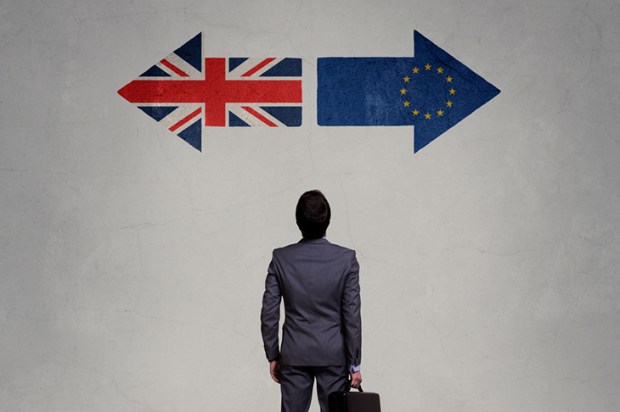Mostly I stay confident the Prime Minister’s team are playing a weak hand badly, but my confidence does occasionally falter. Then Downing Street does something really stupid (like expelling 21 of its own parliamentary party) and I’m reassured that these people aren’t clever at all.
This happened last weekend when I opened my Sunday Times to find there a personal attack on Sir Oliver Letwin by ‘senior sources’. These sources had scoffed to journalists that when, before the Commons vote on his amendment, Letwin was at Downing Street to discuss it, he was taking ‘conspiratorial phone calls’ on his mobile phone, giving him ‘instructions’ from David Pannick. Lord Pannick is the eminent QC whom Sir Oliver has sensibly consulted for legal advice. ‘One witness’ (claimed these sources) said Letwin walked through No. 10 ‘giggling like an eight-year-old and had to keep calling Pannick on his mobile to find out what he was allowed to do’. Lord Pannick ‘furiously denied the claims’, insisting he’d had no phone conversations with Letwin during that time, and adding that it would anyway not have been wrong if he had. Quite.
I experienced a moment of indignation on Letwin’s behalf, followed by a more cheering reflection: Downing Street is not thinking straight. Agree or disagree with Sir Oliver, few who know him see him as less than a deeply serious, capable and decent chap. How was sneering at him in the Sunday news-papers going to help bring him back onside for the ‘meaningful vote’, whenever it came?
A stray thought, anyway, from a columnist the drift of whose thinking is turning to the wording of a confirmatory referendum. You may think me premature: by the time you read this the Johnson deal may have passed the Commons and be proceeding to the slew of consequential legislation that would be needed. An expected amendment to make any deal subject to a confirmatory referendum may well have failed, or not yet been put. All this is very possible. But unless the DUP can be squared, there remains a substantial chance that any deal will at some point end up unable to pass parliament without a reference to the electorate in a new referendum.
Until now we have tended to speak of this new/second/confirmatory referendum in general terms. It may soon be time to talk about what the actual question should be. It’s surely incumbent on those who (like me) advocate asking the voters again to suggest what we should ask. I will come to my own proposal in a moment, but first some general observations. They’re based on the assumption that there will exist a draft deal, agreed with the rest of the EU, that can be called ‘the government’s proposed deal’.
If the only choice the referendum question offers is between the government’s proposed deal, and Remain, then ‘hardline’ or ‘clean-break’ Brexiteers will feel cheated: and I’d sympathise with them.
If the only choice offered is between a no-deal Brexit and Remain then those many who want an agreed deal will feel similarly cheated: again (I think) justifiably.
And if the choice is simply between no-deal and the proposed deal, Remainers will feel cheated. The Labour party has already said Remain must be an option: and I agree.
So it looks like we should put three options to the electorate. But if all three are offered in the referendum question, and the most popular answer is deemed the winner, there’s a serious chance that whichever is chosen will have been backed by a minority of voters. Many (including me) will not see this as a democratically persuasive outcome.
So let me propose two alternative escapes from this dilemma. My first proposal is that voters would be given a single ballot paper which will say something like this:
‘Please answer both questions. You should answer the second question whatever answer you have given the first.
(1) Should Britain (a) remain in or (b) leave the European Union?
(2) If Britain were to leave the European Union, would it be better to leave (a) with the government’s proposed deal; or (b) without a deal?’
Once polls had closed, an initial count should take place: a count only of answers to the first question. If there is a majority for Remain there would be no further count. Britain would remain. If, however, Leave wins at the first count, then a second count would take place. This would decide whether we leave without a deal, or with the gov-ernment’s proposed deal.
There is another way of achieving what my first proposal seeks, and that is to ask voters to rank the three options — Remain, Deal, No Deal — in order of preference. At the count, if any of those three achieved an absolute majority, this would be the plebiscite’s answer, and final. But if none did, the least popular of the three would be eliminated, and the second preferences of those who had supported it would be added to one or the other of the two options left standing. The more popular would then be the plebiscite’s answer.
Though both proposals seek a similar reading of the popular will, I marginally prefer the first because a majority of voters would feel they had ‘chosen’ the winning option, if not on the first vote then on the second. In theory the difference is illusory, but in practice it’s psychologically important. When we Tories select a parliamentary candidate from three or more candidates, this is achieved by a variant of my first proposal: if no candidate wins an absolute majority at the first count, then whoever came last is eliminated and everybody votes again, until only two are left standing. A majority will feel that their ‘first choice’ won, even if this was their first choice only at the final round.
So to those many readers who have enquired ‘But what question would you ask?’ that’s my first stab at an answer. See what you think.
Got something to add? Join the discussion and comment below.
Get 10 issues for just $10
Subscribe to The Spectator Australia today for the next 10 magazine issues, plus full online access, for just $10.
You might disagree with half of it, but you’ll enjoy reading all of it. Try your first month for free, then just $2 a week for the remainder of your first year.















Comments
Don't miss out
Join the conversation with other Spectator Australia readers. Subscribe to leave a comment.
SUBSCRIBEAlready a subscriber? Log in